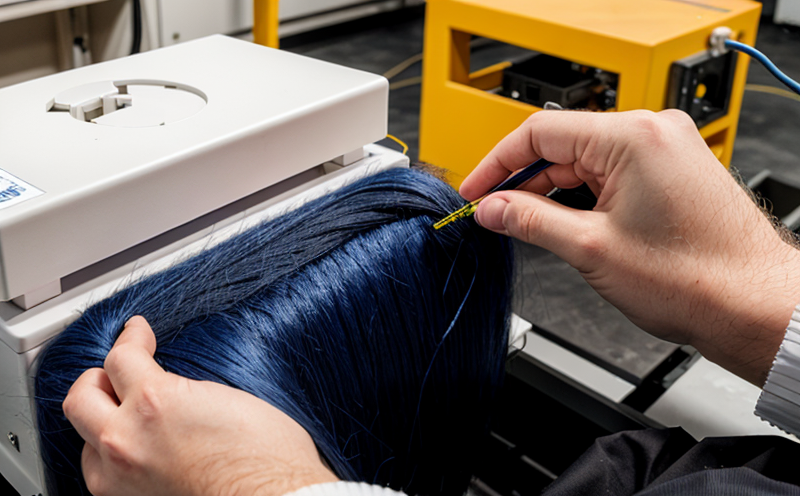Fiber Identification & Composition Testing
The process of fiber identification and composition testing is essential in various sectors such as textiles, apparel manufacturing, and home goods. This service plays a crucial role in ensuring product quality, compliance with international standards, and meeting customer expectations. Accurate identification allows manufacturers to source the correct raw materials, which impacts the performance, durability, and cost-effectiveness of their products.
Identifying fibers is particularly important for companies involved in textile manufacturing or sourcing. The ability to distinguish between different types of fibers can influence decisions about material selection based on desired properties like elasticity, strength, or thermal conductivity. For example, cotton may be chosen over polyester if a higher level of comfort and breathability is required.
Composition testing provides insights into the proportion of various components within a given sample. This information helps in assessing whether products meet specific requirements set by regulations or internal quality standards. In some cases, it could also reveal unexpected mixtures that need further investigation to understand their origin.
When performing these tests, laboratories adhere strictly to recognized international standards such as ISO 13027 - Textiles - Determination of the Proportion of Components in Mixtures of Natural and Man-Made Fibres. Compliance with these guidelines ensures consistent results across different testing facilities worldwide.
The methodology typically involves sampling techniques tailored to ensure representative samples are collected from larger lots or batches. Sample preparation steps vary depending on the type of fiber being analyzed but generally include washing, drying, and conditioning the sample under controlled conditions.
- Customer Impact: Accurate identification enables companies to source materials more effectively, leading to improved product performance at lower costs.
- Satisfaction: Reliable test results contribute significantly towards maintaining customer trust and satisfaction by delivering consistent quality across all products.
By adhering closely to established protocols and using advanced analytical tools like near-infrared spectroscopy (NIRS), gas chromatography-mass spectrometry (GC-MS), or Fourier transform infrared spectroscopy (FTIR), laboratories ensure precise measurements. These methods allow for rapid identification of even complex mixtures, providing quick turnaround times that meet industry demands.
In conclusion, fiber identification and composition testing is vital for maintaining high standards in the textile sector. By leveraging accurate identification techniques coupled with robust compositional analysis, manufacturers can enhance product quality while ensuring compliance with relevant regulations.
Quality and Reliability Assurance
The importance of quality assurance cannot be overstated when it comes to fiber identification and composition testing. Consistent adherence to established protocols guarantees accurate results every time. This not only builds trust with customers but also helps maintain a positive reputation within the industry.
One key aspect of our approach is ensuring that all personnel involved in the process are trained extensively on best practices. Regular calibration of equipment ensures optimal performance, while rigorous quality control measures help identify potential issues early on. By maintaining strict adherence to international standards such as ISO 13027 and ASTM D5864, we ensure consistency across different batches or samples.
Moreover, our commitment extends beyond mere compliance; it involves continuous improvement efforts aimed at enhancing both accuracy and efficiency. This includes regular updates to methodologies based on advancements in technology or changes in regulatory requirements. Through proactive communication with clients, we stay abreast of evolving needs and adapt our services accordingly.
- Customer Impact: Reliable test results foster greater customer trust, leading to increased satisfaction levels.
- Satisfaction: Consistent quality ensures that customers receive products they expect, enhancing overall satisfaction.
In summary, our rigorous quality assurance measures play a pivotal role in delivering dependable fiber identification and composition testing services. By combining cutting-edge technology with experienced personnel and unwavering commitment to excellence, we strive to meet and exceed expectations in every aspect of the process.
Customer Impact and Satisfaction
The impact of accurate fiber identification cannot be understated. It directly influences several aspects critical for customer satisfaction:
- Product Performance: Understanding the exact composition allows manufacturers to optimize product performance, ensuring that each component contributes optimally towards desired outcomes.
- Pricing Strategy: Knowing precisely what goes into a product helps in setting competitive prices without compromising on quality or profitability.
- Customer Trust: Providing transparent and reliable information about raw material sources fosters trust between companies and their customers.
In terms of satisfaction, accurate identification ensures that expectations align with reality. When clients receive products that meet specified requirements consistently, they are more likely to remain loyal, recommending the service to others.
Furthermore, this level of detail aids in problem-solving when issues arise during production or after delivery. Quick resolution contributes positively towards enhancing customer experience and maintaining long-term relationships.
Competitive Advantage and Market Impact
In today’s competitive market, having accurate fiber identification capabilities offers significant advantages:
- Precise Material Selection: Being able to accurately identify fibers allows businesses to make informed choices about which materials best suit their needs. This leads to improved product quality and innovation.
- Regulatory Compliance: Ensuring that products meet all necessary regulatory requirements is crucial for avoiding penalties and maintaining a good standing in the market.
- Market Positioning: Offering superior testing services can elevate a company’s profile, positioning it as a leader in its field. This attracts more business opportunities while deterring competitors from entering certain markets.
The ability to accurately identify and compose fibers also impacts how companies position themselves within their respective sectors. For instance, knowing the exact blend of materials used in fabrics can help textile manufacturers differentiate their offerings from those of competitors. Similarly, home goods producers might emphasize eco-friendly practices by highlighting sustainable fiber sources.
Moreover, this service enables businesses to stay ahead of trends and adapt quickly to changing consumer preferences. By continuously monitoring market demands through accurate testing, companies can introduce new products that resonate well with target audiences.





